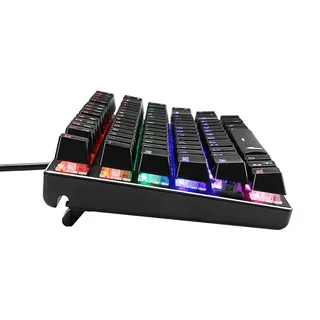In the ever-evolving world of tech, the tools we use to interface with our devices can greatly affect productivity, comfort, and overall user experience. One frequent debate among writers, gamers, and professionals is small mechanical keyboard vs laptop keyboard—which is better, and why? This article breaks down the pros and cons of each, helping you decide which is right for your needs.
Build and Design
Small Mechanical Keyboard
A small mechanical keyboard, often 60% or 75% in size, eliminates the number pad and sometimes even the function row to save space. Despite their compact footprint, they maintain mechanical switches that provide tactile feedback and audible clicks (depending on the type of switch), making them a favorite among typists and gamers.
Laptop Keyboard
Laptop keyboards are built into the chassis of the computer. While this provides convenience and portability, these keyboards are often shallow, with membrane or scissor switches that lack the tactile feedback of mechanical ones. Their compact design can also lead to cramped typing for extended periods.
Typing Experience
Mechanical Feel vs Soft Touch
When it comes to the typing experience, the comparison of small mechanical keyboard vs laptop keyboard highlights a key difference: mechanical keyboards offer more responsive keystrokes. This can reduce typing fatigue and improve accuracy over long sessions. Laptop keyboards, while quieter, may not offer the same satisfaction or performance for heavy typists.
Portability and Convenience
Laptop Keyboard
The major benefit of a laptop keyboard is that it’s always with you—no extra gear required. For professionals on the go, this is a significant advantage. However, if the keyboard fails or feels uncomfortable, it’s not easily replaceable without affecting the entire device.
Small Mechanical Keyboard
While less portable than a built-in laptop keyboard, small mechanical keyboards are still compact enough to fit in a backpack. Many models are wireless or come with detachable cables, making them convenient for mobile setups. They’re also customizable, allowing users to switch keycaps or even the entire layout based on preference.
Durability and Longevity
Mechanical keyboards typically have a much longer lifespan compared to laptop keyboards. A mechanical switch can endure 50 million keystrokes or more, while membrane switches in laptops may wear out sooner. So in the long run, a small mechanical keyboard could be a better investment.
Customization and Features
Customization is another area where mechanical keyboards shine. From RGB lighting to programmable keys, users can tweak a small mechanical keyboard to suit their exact workflow. In contrast, laptop keyboards are fixed in terms of layout and function, offering limited personalization.
Conclusion
When considering small mechanical keyboard vs laptop keyboard, the right choice depends on your priorities. If you value portability and simplicity, a laptop keyboard may be sufficient. But if you prioritize typing comfort, durability, and customization, a small mechanical keyboard can significantly enhance your computing experience.
Whether you’re a gamer, writer, or everyday user, understanding the differences between these two options can help you make a more informed decision for your setup.


